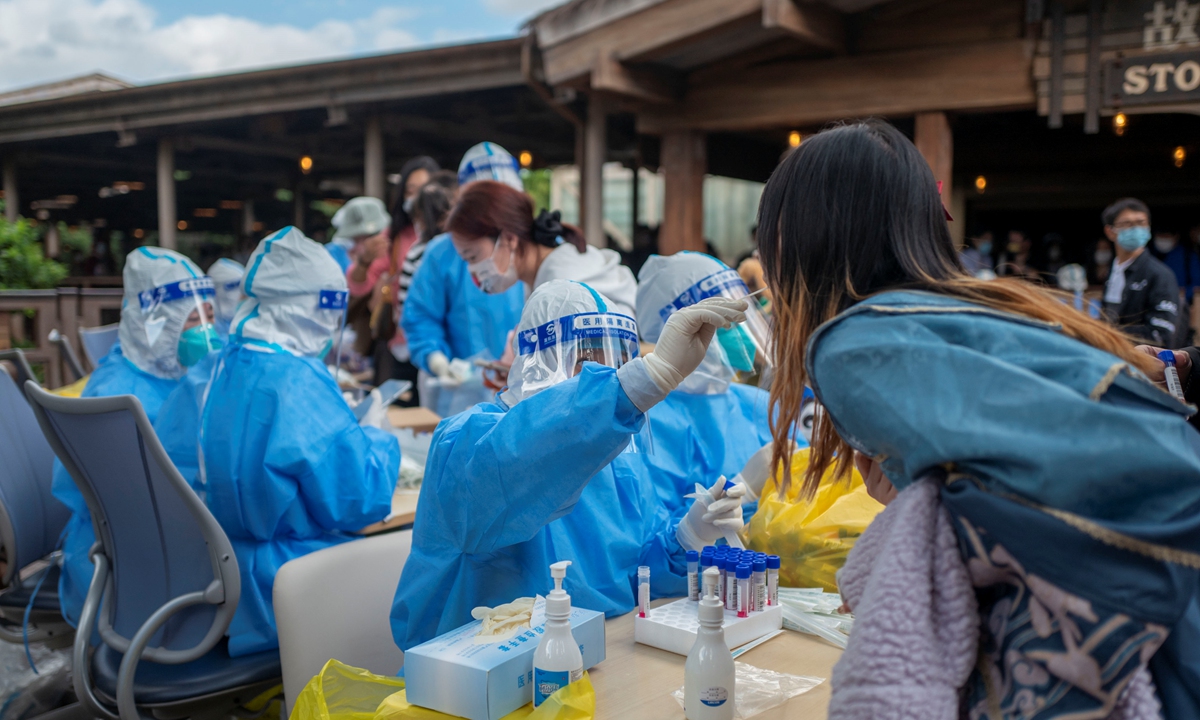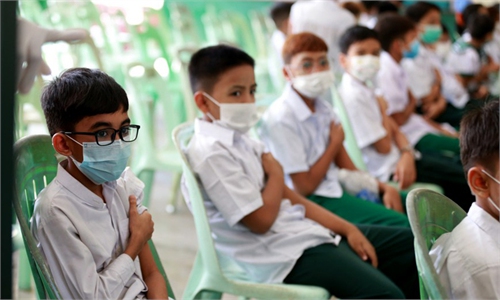
Tourists take nucleic acid test in Disneyland in Shanghai on October 31, 2022. Photo: IC
As COVID-19 flares up in several places across China with total daily cases nearing 3,000, many localities, including Central China's Henan and South China's Guangdong, are stepping up efforts to contain the virus and resume work and life as soon as possible.
To better take precautions against potential COVID-19 outbreaks in the winter and next spring, Henan Province held a meeting on Monday, calling for full preparations in face of the grim epidemic situation and requesting all local officials not to slack off and make all efforts to ensure people's safety and health.
The announcement came as Henan reported 13 confirmed local COVID-19 cases in its capital city Zhengzhou, and 91 local asymptomatic carriers, including 82 in Zhengzhou, according to Henan health authorities on Tuesday.
Zhengzhou's health authority stressed on Tuesday that COVID-19 is preventable and treatable, and there is no need to panic. On the same day, the city decided to gradually resume normal life and production in low-risk areas after about 10 days of temporary controls in an effort to fight the epidemic in a more targeted manner.
Zhengzhou's COVID-19 flare-up attracted wide public attention after Foxconn's factory in the city - the world's largest assembly plant for Apple's iPhones - was affected, with many workers reportedly leaving the facility and walking home.
In response, official working groups have been dispatched to guide the epidemic prevention and control work at the plant. Foxconn vowed to ensure the safe return of employees who wished to return home.
Meanwhile, Guangdong is also facing a serious outbreak, with 700 infections reported on Tuesday. Guangzhou, the provincial capital, is facing pressure from imported COVID-19 cases from other provinces and overseas, and there has also been a local rebound, local authorities said.
Zhuang Shilihe, a Guangzhou-based medical expert who closely follows public health issues, told the Global Times on Tuesday that COVID-19 infections in the city were imported through various ways and the local situation is not optimistic.
In order to curb the virus transmission, Guangzhou Baiyun International Airport canceled 984 flights on Tuesday, accounting for 76 percent of the total, according to flight information provider Flight Master.
However, the flight cancellation rate is not among the highest at domestic airports. Flight cancellation rates at airports, including in Urumqi, Hohhot and Zhengzhou have reached nearly 100 percent, according to Flight Master.
Also, Shanghai Disney Resort suspended operations on Monday with immediate effect due to COVID-19 requirements. The city reported two local confirmed cases and two asymptomatic cases on Tuesday.
Challenged by COVID flare-ups nationwide, medical experts urged the public to take full vaccination as soon as possible.
Soon after Shanghai became the first city in the Chinese mainland to provide the inhaled COVID-19 vaccine boosters in late October, 13 cities in East China's Jiangsu Province launched the deployment of these vaccines, the Global Times learned from Chinese vaccine manufacturer CanSinoBIO on Tuesday.
More than 23 million Shanghai residents have received full vaccination and 12 million of them have received booster shots as of Tuesday, said local authorities. People who received the full series of injections of COVID-19 vaccinations at least six months ago, and are 18 years or older, can receive one free inhaled booster, according to the authorities.
The move is the latest effort by China to explore new and better strategies of mass vaccination in the face of the rapidly mutating virus while upholding a dynamic-zero COVID-19 policy to protect the lives and safety of the Chinese people to the utmost amid nationwide sporadic cases. As of Monday, the Chinese mainland had given 3.44 billion doses of COVID-19 vaccines, the Chinese health commission said.
The latest wave of COVID flare-ups has also sounded the alarm about a "twindemic" as influenza has also entered a period of high incidence, with officials and medical experts calling for accelerated vaccination and other measures to prevent such a scenario.
The Chinese Center for Disease Control and Prevention also issued a notice on Tuesday, warning that there may be a high risk of influenza in the upcoming winter and spring and urging the public to take flu shots. Medical experts said we should not let the guard down as twindemic of influenza and COVID-19 is likely to break out in some areas.



